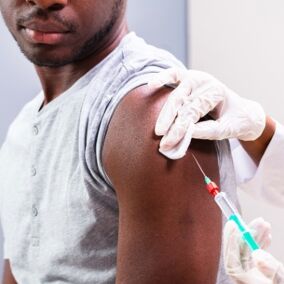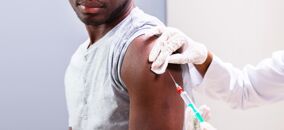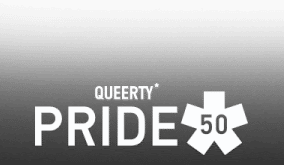
“I called myself a ‘little prairie dyke’ cause I was from the Canadian prairies,” says legendary lesbian comedian and activist Robin Tyler in the opening moments of Netflix’s new documentary Outstanding: A Comedy Revolution. Tyler’s deadpan delivery of coming out in 1958 at the age of 16 is one of many gems captured by director Page Hurwitz in a film that will likely become part of the queer cultural canon.
With a starry lineup including icons like Lily Tomlin and newer voices like Patti Harrison, the interwoven commentaries and historic footage provide a framework for the previously produced Netflix comedy special, Stand Out: An LGBTQ+ Celebration, filmed live in 2022 at Long Angeles’ Greek Theater and featuring dozens of queer comedians.
While Stand Out was primarily about the punchline, Outstanding goes one step further, showing how queer comedy — rooted in both joy and resistance — has been at the center of historical events from the Stonewall Riots to the AIDS crisis, and why in today’s political climate getting the last laugh is just as important.
How about we take this to the next level?
Subscribe to our newsletter for a refreshing cocktail (or mocktail) of LGBTQ+ entertainment and pop culture, served up with a side of eye-candy.
Related*


8 history-making LGBTQ+ comedians who set the stage for modern queer comedy
They helped turn the tide for a community that was once relegated to being the butt of the joke to leading the wave of groundbreaking comedy.
Playwright and producer Roger Q. Mason, known for their play Lavender Men and a self-proclaimed comedy nerd, is featured often in Outstanding, giving historical context.
“Discussing history is about fortifying the present for the future. So it’s always been really important that we understand where we came from so that we know where we’re going and where we can go as creatives and also as a society,” Mason tells Queerty.
Mason grew up listening to a cassette tape of Moms Mabley’s The Greatest Woman in the World, which they describe as inspiring how they live their life today and create art. An out lesbian at the time, Mabley was the first woman to headline New York City’s Apollo Theater and became known for her comedy albums and variety show appearances. Mabley paved the way for comedians like Tyler.
Robin Tyler was the first queer comedian to come out on national television in a 1978 comedy special hosted by Phyllis Diller, but she underplays the moment. “I never came out because I was never in the closet,” Tyler tells Queerty. “Not for a second.”
“The minute I found out that I was a lesbian, I told my mother in 1959. She did not take it well, once we revived her from being passed out. I’ve never been in the closet; I just didn’t know the term lesbian. But when I found out the term, I thought, ‘I’m going to tell everybody I’m an Aries, I’m Jewish, I’m a lesbian.”
Tyler and longtime partner Pat Harrison starred in a short-lived variety special, but when the pair took on anti-gay crusader Anita Bryant, the show was quickly canceled. But the career turn didn’t slow down Tyler or the relationship, though she jokes of her 55-year partnership with Harrison, “There’s no such thing as same-sex marriage because, after marriage, sex is never the same.”

Every person’s coming out journey is unique, as the documentary highlights. Comedian Todd Glass began his career in the ’80s and early ’90s during the height of the AIDS crisis and a time of rampant homophobia. While he was out to friends, Glass didn’t come out publicly until 2012 after a major health scare and a series of nationally reported suicides among LGBTQ+ youth. Watching Outstanding’s premiere at the Tribeca Film Festival was a surreal experience for Glass.
“I saw the documentary and it was a little overwhelming in a good way. It wasn’t lost on me, and I couldn’t even believe I was there because my plan was never to come out. And now I’m sitting in that room, and I can’t believe that I’m here,” Glass tells Queerty. “There were a lot of comedians that I knew back in the ’80s, and they were open about their sexuality, but I didn’t really know how hard it was for them. They were just right next to me all the time, and I didn’t know their struggle.”
While Glass never thought he would come out of the closet, it improved his stand-up after he did.
“Even on nights when I don’t talk about specifically being gay, it’s changed because there were a lot of other things I hid too, like my infatuation with atmosphere and lighting because I thought, ‘Oh, if they know that, then they’ll figure it out.’ It’s made my stand-up much better and much more honest,” says Glass. “Although comedy will change over the years, authenticity is something that will always be something that you see in good comedy. It made me more authentic as a performer.”

Glass was far from the only comedian that faced personal and professional challenges an unrelenting entertainment indsutry. In the mid-90s, Margaret Cho began her stand-up career as an out queer woman, even if it would affect her career. Cho talks about her short-lived 1994 sitcom All-American Girl (co-starring BD Wong as her brother) in Outstanding, saying ABC didn’t understand her intersectional identity as Asian, queer and female, but Cho committed to remaining authentic and threw herself into stand-up.
“I always appreciate comedians that are authentic and present themselves. To me, it’s the most meaningful form of art when it’s really about the artist. To me, what’s the most entertaining, often what’s the most funny, and so it’s what I just naturally gravitated towards doing — using my life as art itself,” Cho tells Queerty.
Cho’s long and storied career has inspired the next generation, referring to comedians like Joel Kim Booster and Sherry Cola as her children. “It’s wonderful because it makes it all worth it. Anytime that I had doubts or thought, ‘Why am I even doing this?’ ‘Does anybody appreciate this?’ That’s why I want to keep going. Also, I’m definitely hitting them up for jobs. I’m always trying to get handouts from Joel or Bowen [Yang]. I’m riding their coattails because I love them, and it’s giving me some job security,” Cho says with a laugh.
Related*


PHOTOS: An appreciation post for Joel Kim Booster’s body-baring red carpet serves
Joel Kim Booster had made an art out of looking snatched!
Cho lists some of her favorite comedians of this new generation, including Sabrina Wu, Dylan Adler, Robin Chan, and Roz Hernandez.
Hernandez hosts the paranormal podcast Ghosted!, also appears in Outstanding, and specifically addresses trans comedy’s evolution. Hernandez initially performed as a drag queen and has noticed a significant change in interest in drag, gender variance, and gender expression since she began stand-up in 2013. While there are more trans comedians than ever, Hernandez isn’t yet satisfied.
@itsrozhernandez Butch straight lady #comedy #trans #transgender #nonbinary #gay #queer #lol #funny #comedyvideos #standupcomedy #viral #humor #jokes #lgbtq #funnyvideos #fyp #lgbtq ♬ original sound – Roz Hernandez
“We have not seen very much when it comes to stand-up specials on major streaming platforms from transgender comedians, particularly transgender women or feminine people. I feel that a lot of the humor that the masses are seeing about the transgender experience is not coming from transgender people,” Hernandez tells Queerty.
“I’ve been in my lab with my little beakers and all my equipment trying to figure out the right ways to find humor in the trans experience, which is something that so many of us are now conditioned to believe is not something you joke about. It’s a very serious thing in our world, but there’s a lot of humor to it. I’ve figured out ways to make people who are trans and allies laugh, and maybe people who don’t know trans people can be like, ‘Oh, there’s humor in your life too, just like mine.’ I really do want my own special. I’ll just say that.”
Perhaps the comedy revolution is more like an evolution.
Comedian Tyler, who emceed 1979’s National March on Washington for Lesbian and Gay Rights and its second outing in 1987, and has been a grand marshall for Pride parades in Long Beach, California, and Vancouver, Washington, has witnessed and participated in queer comedy’s transformation.
“Humor is a very strong way for us to express ourselves. It is a tool,” says Tyler. “I had tears in my eyes when I was watching the documentary for the first time. I remember being at the Troubadour and [people] yelling, ‘Get off the stage,’ ‘You’re a dyke.’ It’s great not to be alone. And it’s great that as we’ve evolved as a civil rights movement, our humor has evolved to not only protect us but to be used as a weapon.”
Don't forget to share:
















































